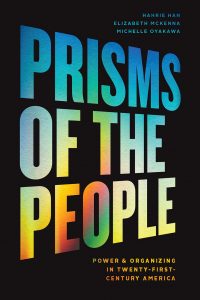5 Questions with Michelle Oyakawa, Coauthor of “Prisms of the People”
Grassroots organizing and collective action have always been fundamental to American democracy but have been burgeoning since the 2016 election, as people struggle to make their voices heard in this moment of societal upheaval. In Prisms of the People, Hahrie Han, Elizabeth McKenna, and Michelle Oyakawa show how the power of successful movements most often is rooted in their ability to act as “prisms of the people,” turning participation into political power just as prisms transform white light into rainbows. Understanding the organizational design choices that shape the people, their leaders, and their strategies can help us understand how grassroots groups achieve their goals. We asked Michelle Oyakawa a few questions about the book.
How did you become interested in grassroots organizing and collective action? What led you to write about it?
Each of us came to this work by engaging directly with organizations that engage people in public life and agitate for change. Participating in organizing and witnessing the promise it holds for both personal and political transformation inspired us to further investigate and understand how people can come together to build power for themselves and their communities.
We are motivated by hope and resistance against cynicism and despair. We want to help leaders and organizations that are doing the insanely difficult work of trying to make democracy live up to its promise of truly allowing people to engage in self-governance.
The motivation for writing about this is, at its core, about wanting to fight the racism and extreme economic inequality that leads to violence, social instability, and great hardship for many people.
How has the pandemic affected grassroots organizing and collective action?
Organizing is still happening. Too often, people think organizing is just about big protests in Washington, or other similar events covered in the national media. As we discuss in our book, however, organizing is so much more than that. It begins with people building relationships with each other and learning to transform those relationships into power to make the change that they want. That work has been going on throughout the pandemic. On social media, instead of seeing images of people sitting around tables in church basements, we are seeing screenshots of Zoom meetings. Like many in other fields like education and business, organizers have found ways to continue their work virtually.
In-person actions and protests are also still going strong, particularly when people are able to gather outdoors, as evidenced by mass mobilization and protests for Black Lives Matter in the summer of 2020.
People are going through significant personal challenges because of the pandemic and still finding time and energy to devote to collective action, in part because the political issues that impact our lives are not erased by the pandemic. In fact, the pandemic has actually revealed even more clearly the extent to which many are suffering.
While working on the book, what did you learn that surprised you the most? Did your research turn up anything interesting that didn’t make it into the final manuscript?
We learned about the surprising extent to which existing systems for promoting civic engagement are not helpful for building the capacities that allow people to exercise collective agency. There is often a huge disconnect between the conversations we see prominently in media and academic spaces about collective action and the perspective of people actually trying to make things work on the ground. We were impressed by the creativity of the leaders trying to navigate the difficult terrain of building people power in a system set up to empower elites instead.
One aspect we did not focus on so much in the book but that was present in all of our cases was the personal transformation that the leaders in our organizations went through as they took political action to fight for themselves and their families. People are not only struggling with powerful institutions and social forces, they are also wrestling with themselves to find the courage to take action. Organizations can help leaders navigate this and provide them with support and a vehicle to make their voice heard.
What do you most hope people take away from your book?
We want people who read our book to find inspiration and hope that engaging in politics can make it possible to build a better world. We hope that our cases will reveal the strategic logic of how change happens. When people come together, build connections with one another, take action repeatedly and reflect on it together afterwards, they can create a better world for themselves, their families, and their communities.
We hope that our book will help to people interested in building people power, particularly those who want to use that power to fight for racial and economic justice. Ideally, organizations can apply the insights to their own work, and those who fund, research, and support civic engagement can better understand what it takes to create the outcomes they want to achieve.
Where will your research and writing take you next?
I (Michelle) will be working on publishing my dissertation, which discusses how the “non-profit industrial complex” impacts social movement organizations.
Hahrie is working on another book, to be published with Knopf (an imprint of Penguin Random House), about faith and race in America, with a particular focus on evangelical megachurches.
Liz is also working on publishing her dissertation, a five-year study of political terrain shifts in Brazil, which examines when civil society safeguards against authoritarianism and when it becomes the primary carrier of it.

Michelle Oyakawa is visiting professor at Kenyon College.
Prisms of the People is available now from our website or your favorite bookseller.
